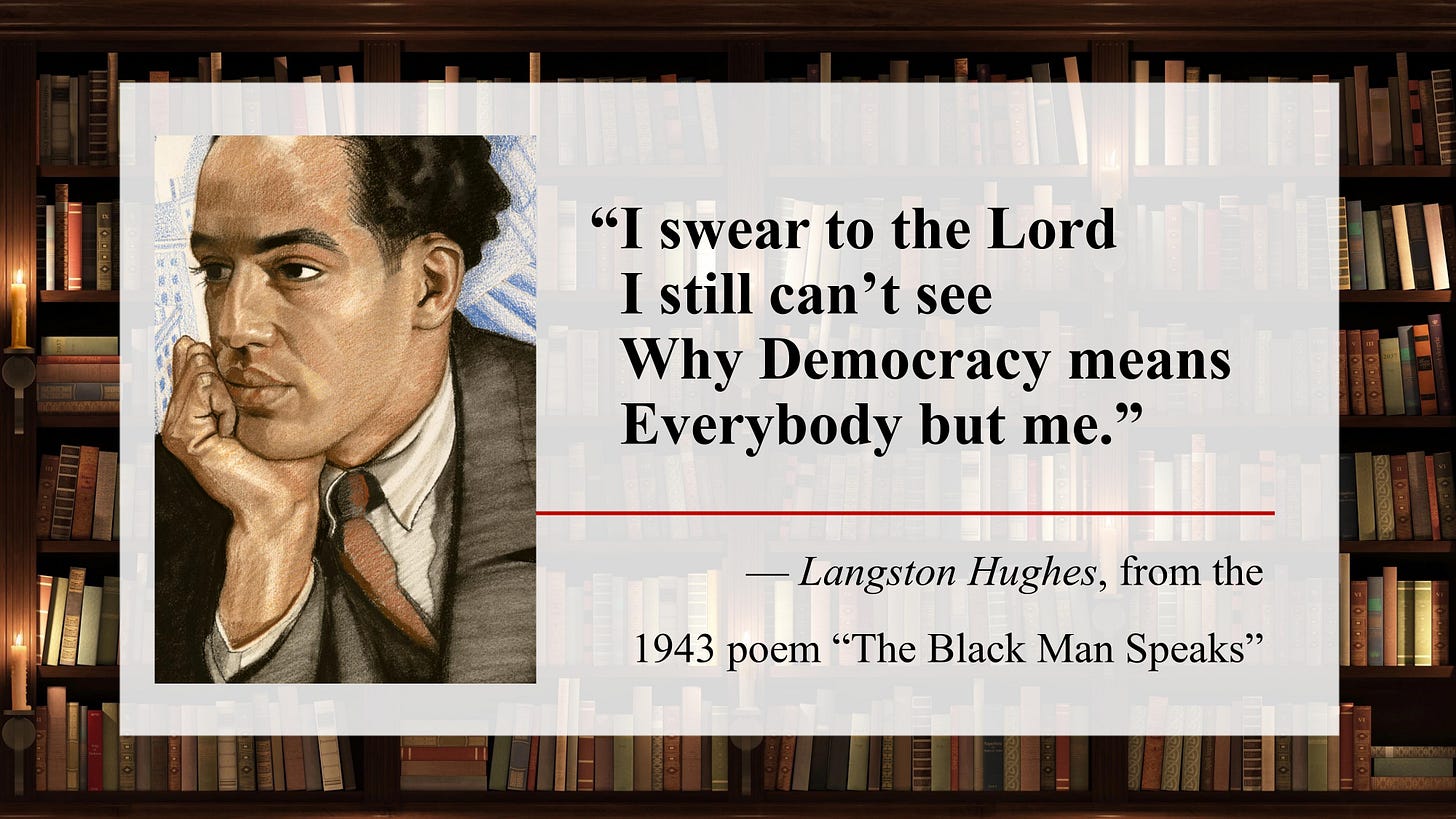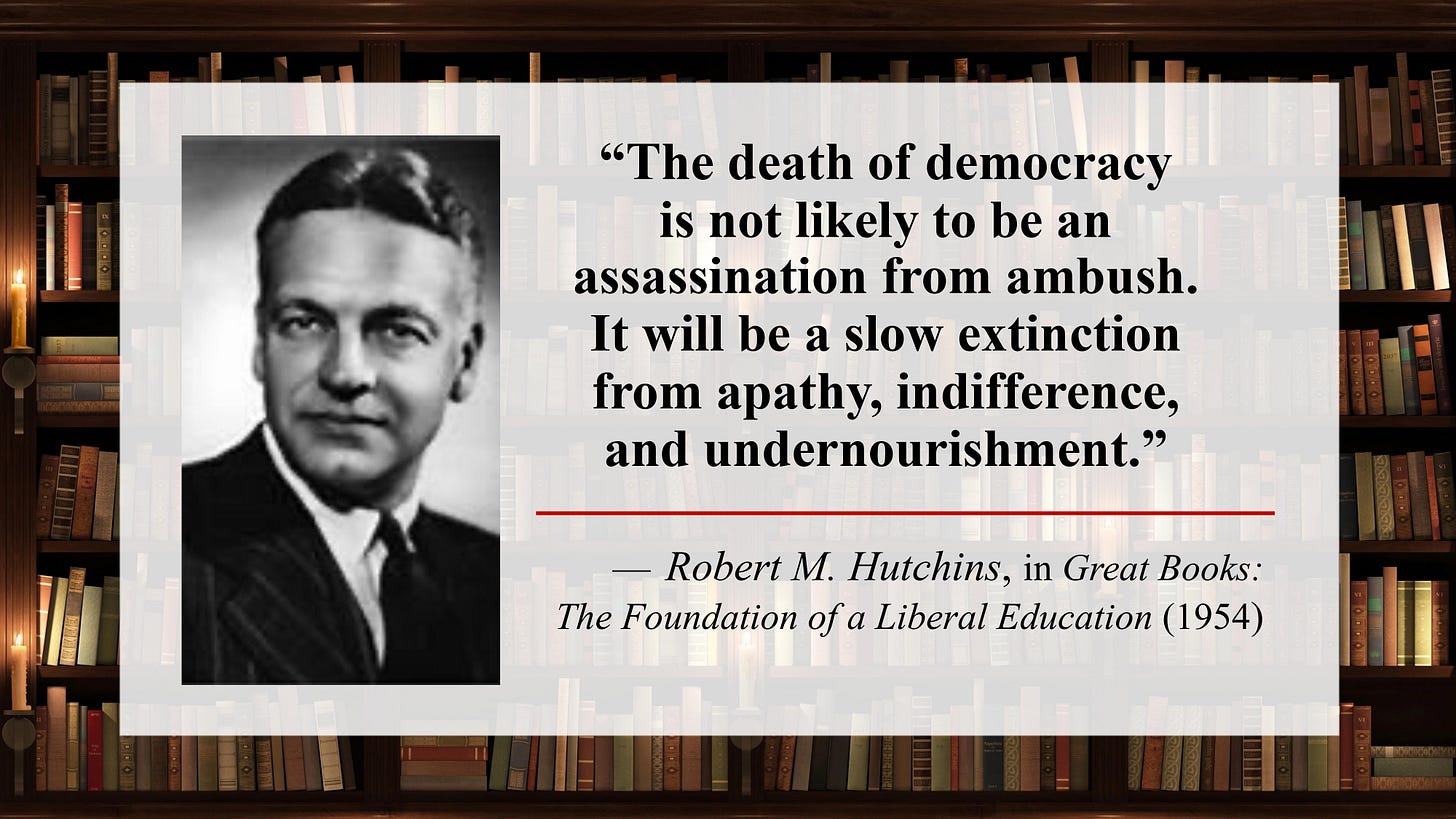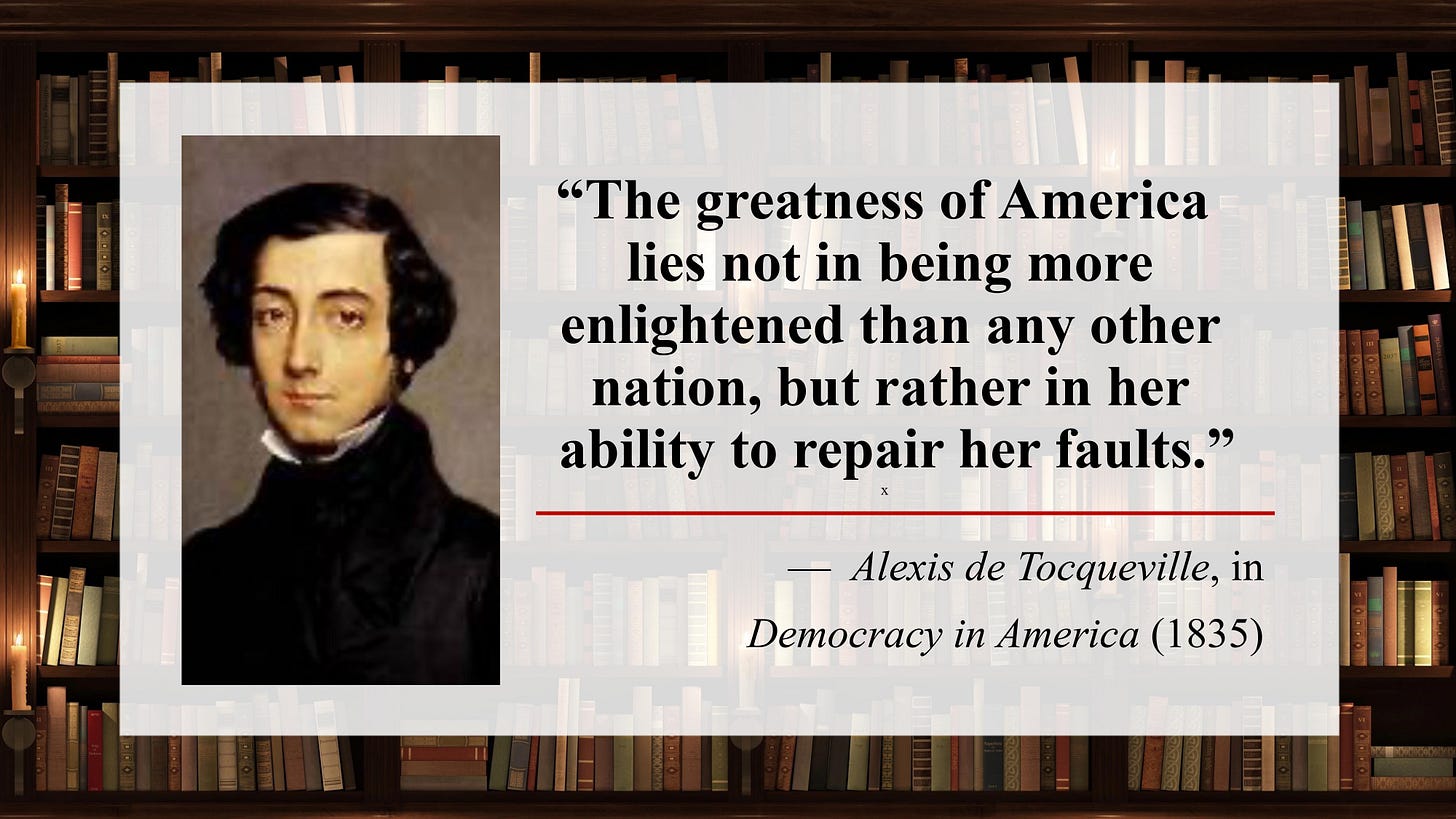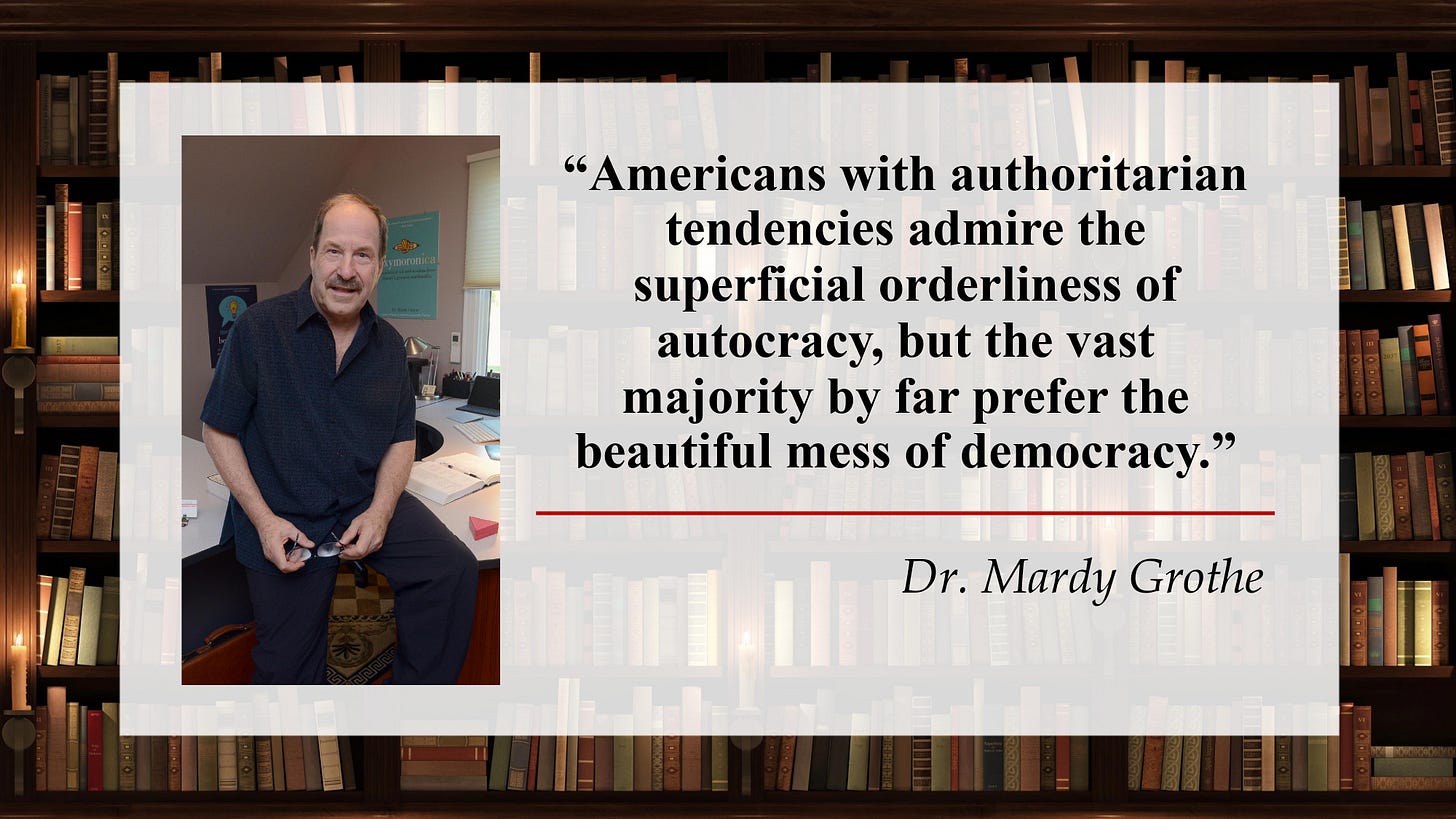Dr. Mardy's Quotes of the Week ("Democracy")
August 25—31, 2024 | THIS WEEK'S THEME: “Democracy"
Opening Line of the Week
In the opening words of his poem, Hughes spoke to perhaps the greatest problem with the great American experiment in democracy: full citizenship was not granted to all of its citizens.
The concept of democracy originated in the city-state of Athens in ancient Greece. The word itself comes from the Greek words demos, meaning “people,” and kratos, meaning “power” or “rule.” Democracy literally means “rule by the people.”
If you’re like most people, you probably regard democracy as the best form of government. But that doesn’t mean it’s without its problems. Democracy is, after all, a human institution, and all human creations have imperfections. This week, we’ll take a look at several problems associated with democracy, especially American democracy.
At the signing of the Declaration of Independence in 1776, slavery was legally permitted in all of the thirteen colonies. It was far more pervasive in the South than the North, and when those southern colonies eventually became a part of the United States of America, they were known as “slave states.”
The practice of slavery continued until 1865, when the Union victory in the Civil War sounded its death knell (it formally ended with the ratification of the 13th Amendment to the U.S. Constitution on December 6, 1865). For the next century, though, systematic racism continued to persist in a wide variety of forms—and when Langston Hughes wrote “The Black Man Speaks” in 1943, he clearly didn’t believe that the blessings of American democracy had been extended to him.
For nearly 2,000 memorable opening lines from every genre of world literature, go to www.GreatOpeningLines.com.
This Week’s Puzzler
On August 27, 1963, this man died at age 95 in Accra, Ghana. At his death, he was a towering—and controversial—figure in Black History. He was one of the founders of the field of sociology, a co-founder, in 1909, of the National Association for the Advancement of Colored People, and the author of The Souls of Black Folk (1903), a classic in African-American literature. In that work, he presciently wrote: “The problem of the twentieth century is the problem of the color line.”
Born in 1868 in Great Barrington, Massachusetts, he was raised in a “free black” community of about fifty people in a community of 5,000 mostly white citizens. Even though he personally experienced little racism in his early years, he still harbored great feelings of distrust and suspicion about the greater white culture. Years later, in his autobiography Dusk at Dawn (1940), he wrote that he was born “with a flood of Negro blood, a strain of French, a bit of Dutch, but, thank God, no Anglo-Saxon.”
After graduating with honors from the town’s public high school, he attended Fisk University, receiving a B.A. in 1888 (his tuition and other college expenses were paid for by the First Congregational Church of Great Barrington, now on the National Register of Historic Places). He returned to New England to do post-graduate work at Harvard University, receiving an M.A. degree in 1891 and a Ph.D. in 1895 (he was the first African-American to earn a Ph.D. from Harvard).
In addition to his many books, essays, and lectures, he helped shape the NAACP into a powerful force in American society, challenging segregation and racial discrimination through a variety of means. He also served for many years as editor of the NAACP’s hugely influential magazine, The Crisis. In the 1930s, after a number of serious policy disagreements with the leaders of the NAACP, he formally parted ways with the organization he helped found a generation earlier.
Throughout his life, he was a steadfast critic of racism and capitalism (he was actually a member of The Socialist Party of America from 1910-12, but resigned over some of the party’s racist practices). In his later years, his reputation as a serious scholar deteriorated significantly in America and the West as he became increasingly radical, warmly embracing both the Russian and Chinese versions of socialism and communism. He moved to Ghana in 1961, where he spent the last years of his life.
Early in his career, he wrote warmly about democracy:
Who is this person? (Answer below)
The Promise & Problems of American Democracy
This week’s Puzzler quotation contains what might be considered an essential tenet about democracy—that greatness lies in ordinary people. Over the years, many people have said something similar, and a few decades ago, I was delighted to see the sentiment expressed by one of my favorite people, the NBA legend and former U. S. senator Bill Bradley. In a 1989 commencement address at Middlebury College, he said:
“An article of the democratic faith is that greatness lies in each person.”
This week’s Mystery Man would have wholeheartedly agreed, but he would have probably been quick to add “in each person, regardless of color.” He might have also argued that America didn’t deserve to be considered a true democracy if its rights were restricted only to white men. In fact, in a 1920 book, he offered a thought that perfectly anticipated Langston Hughes’s 1943 observation about democracy not applying to him.
This observation reminds us that the new American nation also unfairly treated women by not granting them citizenship’s most important right, the right to vote (thankfully, suffrage finally came with the ratification of the Nineteenth Amendment on August 26, 1920). So, as with African-American men, white women as well as women of color also fell victim to the first major problem of American democracy: The Failure to Include Everyone. Let’s move on to a second problem.
The Tyranny of the Majority.
In a democracy, the majority rules. That’s the way it’s always been, and that’s exactly what our Founding Fathers intended. But they were not oblivious to the potential problems associated with majority rule. In his First Inaugural Address in 1801, Thomas Jefferson said:
“The will of the majority is in all cases to prevail. But that will, to be rightful, must be reasonable; the minority possess their equal rights, which equal law must protect, and to violate would be oppression.”
That may be the way it works in theory, but in practice, it is now clear that another problem associated with democracies is when we see the majority imposing its will on the minority—and then neglecting, or downright ignoring, their rights.
Alexis de Tocqueville coined the the phrase “The tyranny of the majority” in the second volume of Democracy in America (1840), and he inspired the British historian John Dalberg (better known as Lord Acton) to write the following on the subject:
The Founding Fathers were so deeply concerned about the dangers of a “tyranny of the majority” that they worked diligently to create a system of government that balanced majority rule and minority rights. And so emerged the Electoral College and the bicameral structure of the U. S. Congress.
If you carefully examine Lord Acton’s observation above, you will see that he believed a “tyranny of the minority” was also possible in a democracy. All it takes is for a highly organized—and generally a passionately motivated—political minority to achieve enough political power to jam their policies down the throats of the majority of the population. We saw it happen with Prohibition in the 1920s and early 30s. And, there are many, including me, who believe it also happened in the 2022 Supreme Court decision to overturn Roe v. Wade. There are also some who believe that the victory by the “Pro Life” folks was hastened because a few too many people on the “Pro Choice” side had begun to take their rights for granted.
The Problems of Apathy and Indifference
Over the centuries, many people have made the argument that “eternal vigilance is the price of liberty.” What this means, in practice, is that freedom and democracy, once achieved, are not guaranteed to last forever—and constant effort and watchfulness are required if they are to continue.
In a democracy, though, citizens have the freedom to choose whether or not to engage, and this freedom includes the option to disengage entirely. For a democracy to be healthy and vibrant, the active participation of citizens is essential—and widespread apathy is not just a serious problem but a potentially dangerous one.
Apathy becomes a dangerous problem when it results in a diminished voter turnout. When only a small percentage of eligible voters show up at the polls, important electoral decisions are often decided by small, unrepresentative segments of the population—and this can result in the election of leaders and the implementation of policies that may not be in the best interests of society as a whole.
When apathy and indifference result in reduced voter participation, it also increases the chances of bad actors assuming the reins of power—and that brings us to the next problem associated with democracy, and the last of the problems I’ll be discussing today.
The Problem of Chicanery
Chicanery—the use of trickery or deceit to achieve a result or advance an agenda—has been a persistent problem for democracies from the very beginning. No form of government is free from the problem, but in a system in which power is supposed to be derived from the will of the people, politicians and lawmakers who lie, cheat, and steal are thrusting daggers into the very heart of democracy.
Government, as so many have observed over the centuries, is about power, and in the first century A.D., the Roman historian Tacitus described the lust for power as “the most flagrant of all the passions.” In an 1829 speech, the former president James Madison picked up on the idea by saying: “The essence of government is power, and power, lodged as it must be in human hands, will ever be liable to abuse.”
Given this, the only proper conclusion is to recognize that (a) attempts to achieve power by highly questionable means have been around for a long time, and (b) they aren’t going away anytime soon.
So, what does this mean for you? In the future, whenever you’re trying to judge a politician’s words or actions or proposals, may I suggest that you apply the time-honored “What Would Jesus Do?” exercise, although in this case, I would recommend you use Abraham Lincoln as your moral guide. Just ask yourself, “What Would Abe Do?” or “What Would Abe Say?”
The exercise may take you in a variety of different directions, but when I first tried it, this thought came immediately to mind: “As I would not want my vote gerrymandered away, I don’t want to gerrymander the votes of anyone else.”
Let me conclude my thoughts about the potential problems of democracy—especially in America—by reminding you of what Alexis de Tocqueville had to say on the subject in his classic 1835 work Democracy in America. Yes, America had problems, he wrote. Big problems, in fact. But he had a profound admiration for America’s adaptability and its capacity for self-correction and reform, and he expressed his opinion in a memorable way:
And also on the subject of democracy, a little over seventy-five years ago, Winston Churchill said in a speech in the House of Commons:
Ever since, this observation has been presented in a simplified way that suggests it is a direct Churchill quotation: “Democracy is the worst form of Government except all those other forms that have been tried from time to time.” However, as you see by the words “it has been said” in the original observation, Churchill was not presenting the thought as his own, but something he’d heard, and obviously admired.
This week, take a few moments to think about democracy—and any problems with the democratic form of government that have been of concern to you. Before doing anything, though, take a few moments to peruse this week’s selection of quotations on the theme:
The fabric of democracy is always fragile everywhere because it depends on the will of citizens to protect it, and when they become scared, when it becomes dangerous for them to defend it, it can go very quickly. — Margaret Atwood
At the bottom of all the tributes paid to democracy is the little man, walking into the little booth, with a little pencil, making a little cross on a little bit of paper—no amount of rhetoric or voluminous discussion can possibly diminish the overwhelming importance of that point. — Winston Churchill
My political ideal is that of democracy. Let every man be respected as an individual and no man idolized. — Albert Einstein
To define democracy in one word, we must use the word “cooperation.” — Dwight D. Eisenhower
In an autocracy, one person has his way; in an aristocracy a few people have their way; in a democracy, no one has his way. — Celia Green
Even though counting heads is not an ideal way to govern, at least it beats breaking them. — Learned Hand
The thing about democracy, beloveds, is that it is not neat, orderly, or quiet. It requires a certain relish for confusion. — Molly Ivins
This country can have no more democracy than it accords and guarantees to the humblest and weakest citizen. — James Weldon Johnson
The rock of democracy will founder when people in other parts of the country or in other parties begin to see each other as The Other, rather than as common citizens. — Theodore Roosevelt
Democracy is not a tea party where people sit around making polite conversation. In democracies people get extremely upset with each other. They argue vehemently against each other’s positions. (But they don’t shoot.) — Salman Rushdie
For more quotations on the theme of DEMOCRACY, go here.
Cartoons of the Week:
Answer to This Week’s Puzzler:
W. E. B. Du Bois (1868-1963)
Dr. Mardy’s Observation of the Week:
Thanks for joining me again this week. See you next Sunday morning, when the theme will be “AWARENESS.”
Mardy Grothe
Websites: www.drmardy.com and www.GreatOpeningLines.com
Regarding My Lifelong Love of Quotations: A Personal Note
















Normally I do not write political emails. But (you saw that “but” coming, didn’t you?), if you have a chance watch Michelle Obama’s speech at the DNC, do it for yourself. It’ll be the best 20 minutes of your year. For the first time in a very long time Mary Ann and I felt the thrill of what it means to be an American, again. Not to be a Democrat. Not to be white. Not to be pissed off at somebody or something. But - what it feels like to again have the possibility to be a proud American. She speaks of being a family and being nurturing to others. Honestly, it was the best and most moving speech of the entire convention. Poor Barack, who had to follow her.
After watching, I hope you’ll feel your pride in our country come back as well. I’m tired. I don’t want to pick the scab off any more wounds. I want to love where I am in this part of history and to have an honest hope for our future. Folks, it feels good to feel good!
Amen and so be it.
Very timely, Mardy. Thank you.